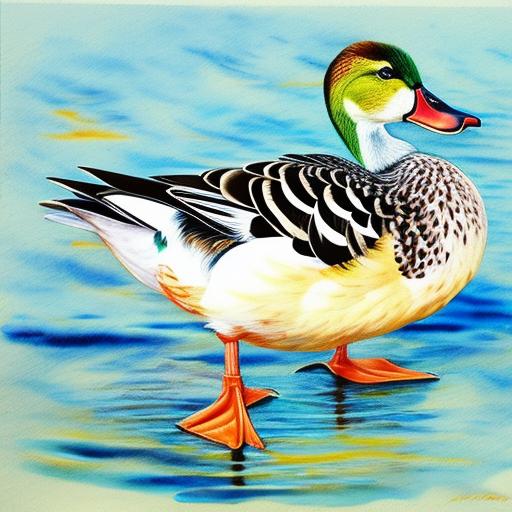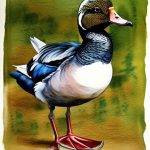Ducks are often overlooked as potential pets, but they can make wonderful companions for the right owner. They are social, intelligent, and can be quite affectionate. Ducks are also known for their entertaining and quirky personalities, which can bring a lot of joy and laughter to a household. While they may not be as common as dogs or cats, ducks can make great pets for those who are willing to put in the time and effort to care for them properly. In this article, we will explore the world of duck pets, including popular breeds, their characteristics and temperament, considerations for ownership, care and housing, as well as training and bonding with these feathered friends.
Key Takeaways
- Ducks make great pets for those with outdoor space and a love for unique animals
- Popular duck breeds for pets include Pekin, Khaki Campbell, and Indian Runner
- Duck breeds vary in size, color, and egg-laying capabilities
- Considerations for duck pet ownership include providing proper housing, diet, and veterinary care
- Duck care and housing require access to water for swimming and foraging, as well as protection from predators
Popular Duck Breeds for Pets
There are several popular duck breeds that are commonly kept as pets. The Pekin duck is one of the most popular choices, known for its friendly and docile nature. Pekin ducks are also excellent egg layers, making them a practical choice for those interested in raising ducks for their eggs. Another popular breed is the Khaki Campbell, which is prized for its high egg production and friendly disposition. Muscovy ducks are also a popular choice for pet owners, as they are known for being quieter than other breeds and have a unique appearance with their red facial caruncles. Other popular breeds include the Indian Runner, Swedish, and Rouen ducks. Each breed has its own unique characteristics and temperament, so it’s important to research and choose a breed that best fits your lifestyle and needs.
Characteristics and Temperament of Duck Breeds
Each duck breed has its own distinct characteristics and temperament. Pekin ducks, for example, are known for being friendly and sociable, making them great pets for families with children. Khaki Campbell ducks are highly energetic and excellent foragers, while Muscovy ducks are known for their quiet nature and strong maternal instincts. Indian Runner ducks are known for their upright stance and comical waddling gait, making them a popular choice for those looking for entertainment. Swedish ducks are known for their calm and gentle nature, while Rouen ducks are prized for their beautiful plumage and calm temperament. Understanding the characteristics and temperament of each breed is important when choosing the right duck for your household.
Considerations for Duck Pet Ownership
Before bringing a duck into your home, there are several important considerations to keep in mind. Ducks require a significant amount of space to roam and forage, so it’s important to have a suitable outdoor area for them to explore. Additionally, ducks need access to water for swimming and bathing, so a pond or kiddie pool is essential for their well-being. It’s also important to consider the time and effort required to care for ducks, including feeding, cleaning, and providing proper shelter. Ducks are social animals and thrive in the company of other ducks, so it’s recommended to have at least two ducks to prevent loneliness. Lastly, it’s important to check local regulations and zoning laws before bringing ducks into your home, as some areas may have restrictions on owning poultry.
Duck Care and Housing
Proper care and housing are essential for the health and well-being of pet ducks. Ducks require a balanced diet that includes commercial duck feed, fresh vegetables, and access to clean water at all times. It’s important to provide a secure shelter for ducks to protect them from predators and the elements. This can be in the form of a duck house or coop that provides protection from rain, wind, and extreme temperatures. Ducks also need access to water for swimming and bathing, which can be provided through a pond, kiddie pool, or shallow tub. Regular cleaning of their living area is essential to prevent the buildup of waste and bacteria. Additionally, regular veterinary check-ups are important to monitor the health of pet ducks and address any potential issues.
Training and Bonding with Duck Pets

Training and bonding with pet ducks can be a rewarding experience for both the owner and the duck. Ducks are intelligent animals and can be trained to respond to commands and cues. Positive reinforcement techniques such as treats and praise can be used to encourage desired behaviors in pet ducks. Bonding with ducks can be achieved through spending quality time with them, such as hand-feeding them treats, talking to them, and providing gentle physical affection. It’s important to establish trust and respect with pet ducks through consistent and patient interactions. Building a strong bond with pet ducks can lead to a deeper connection and understanding between the owner and their feathered companions.
Choosing the Best Duck Breed for You
In conclusion, owning pet ducks can be a fulfilling experience for those who are willing to provide the necessary care and attention they require. When choosing a duck breed for pet ownership, it’s important to consider the characteristics and temperament of each breed to find the best fit for your lifestyle. Additionally, it’s crucial to consider the space, time, and resources needed to properly care for pet ducks before bringing them into your home. With proper care, housing, training, and bonding, pet ducks can bring joy, companionship, and entertainment to their owners for many years to come. Whether you’re interested in raising ducks for eggs, companionship, or simply enjoy their quirky personalities, there is a duck breed out there that is perfect for you.
If you’re interested in finding the best duck pet breeds, you might also want to explore the fascinating world of guinea fowl. Poultry Wizard offers a helpful article on “When Do Guinea Fowl Lay Eggs,” providing valuable insights into the breeding and care of these unique birds. Whether you’re considering ducks or guinea fowl as pets, understanding their specific needs and behaviors is essential for creating a happy and healthy environment. Check out the article here to learn more about raising guinea fowl alongside your duck companions.
FAQs
What are the best duck pet breeds?
There are several duck breeds that make great pets, including the Pekin, Khaki Campbell, and Indian Runner.
What makes a duck a good pet?
Ducks can make great pets because they are social, friendly, and can be trained to some extent. They also have entertaining personalities and can be quite affectionate.
Do ducks require special care as pets?
Ducks do require special care as pets, including access to water for swimming, a balanced diet, protection from predators, and regular veterinary care.
Can ducks be kept indoors as pets?
While ducks can be kept indoors temporarily, they are best suited to outdoor living due to their need for space, access to water, and natural behaviors.
Are there any legal restrictions on keeping ducks as pets?
There may be legal restrictions on keeping ducks as pets, including local ordinances, zoning laws, and homeowner association rules. It’s important to check with local authorities before getting ducks as pets.
Meet Walter, the feathered-friend fanatic of Florida! Nestled in the sunshine state, Walter struts through life with his feathered companions, clucking his way to happiness. With a coop that’s fancier than a five-star hotel, he’s the Don Juan of the chicken world. When he’s not teaching his hens to do the cha-cha, you’ll find him in a heated debate with his prized rooster, Sir Clucks-a-Lot. Walter’s poultry passion is no yolk; he’s the sunny-side-up guy you never knew you needed in your flock of friends!







